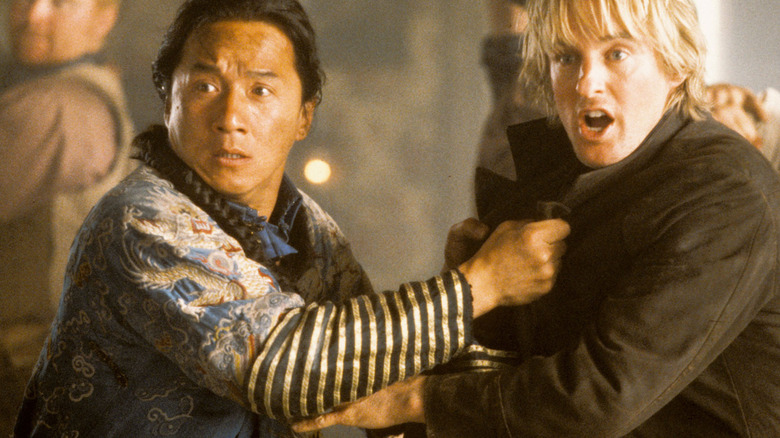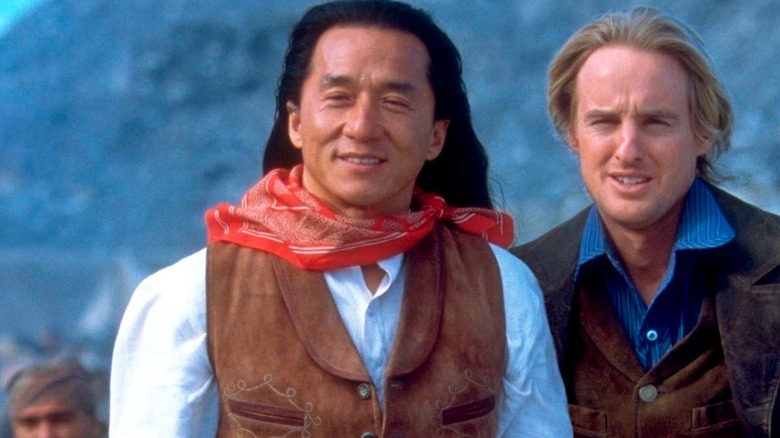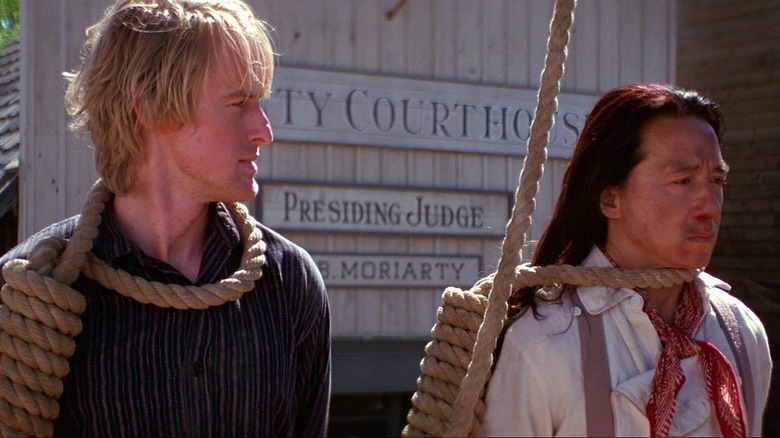Director Tom Dey Thinks He Knows Why Jackie Chan And Owen Wilson's Shanghai Noon Flopped
While Jackie Chan has always been an affable and comedic performer, even going back to his early martial arts films from the 1970s, something curious happened when he broke into the Hollywood mainstream in the late 1990s. Producers looked at Chan's playful, heroic, somewhat goofy charm and shifted it into overdrive. Chan's American films, as a result, tended to be incredibly broad, full of silly mugging, "culture clash" humor, and a general lack of stakes. Chan's first major American hit was Brett Ratner's "Rush Hour" in 1998, a serviceable but largely unremarkable police comedy wherein Chan played opposite Chris Tucker. That film was such a runaway success (it made over $244 million worldwide) that a pattern was immediately set for Chan. Pair him with an unlikely co-star, put him in generic action scenarios, and watch the money roll in.
The next few years saw such pieces of mainstream fluff as Kevin Donovan's "The Tuxedo" (opposite Jennifer Love Hewitt), "The Medallion" (opposite Claire Forlani), "Around the World in 80 Days" (opposite Steve Coogan), two additional "Rush Hour" sequels, and, most notably for the purposes of this article, Tom Dey's 2000 film "Shanghai Noon" and David Dobkin's 2003 sequel "Shanghai Knights," both opposite Owen Wilson.
The premise of "Shanghai Noon" is novel enough: Chan plays Chon Wang (it sounds like "John Wayne"), a royal guard of the Chinese Imperial city in 1881. When the Chinese imperial princess (Lucy Liu) flees the country and hides out in the Old West, Wang follows her to the American frontier. During his search for the missing princess, he forms a partnership with a laconic and friendly gunfighter named Roy O'Bannon (Wilson), and they will spend a great deal of "Noon" comedically bantering.
Martial arts master meets the gunslinger. So far, so good.
Jackie Chan, dumbed down
While "Shanghai Noon" ended up a modest hit — $99 million on a $55 million budget — it opened small. According to a 2000 article in EW, the film's only earned a trim $19 million on its opening weekend, clearly not breaking any box office records, nor matching the financial glories of "Rush Hour." Dey, in the same EW article, lamented the low numbers, having been utterly convinced that his film would at least cross the $30 million mark. He blamed Disney's marketing department for the tepid response, pointing out that the previews for "Shanghai Noon" leaned into the film's broader, more comedic moments and scenes of fish-out-of-water humor.
"Shanghai Noon" is a light, breezy film to be sure, but Dey did not think he was making a comedy. "I feel like it was misrepresented," the director said. "The trailers really dumbed it down." The usage of ZZ Top's "La Grange" and Kid Rock's "Cowboy" in the preview certainly didn't help sell "Noon" as a straightforward Western adventure
Dey would go on to make bright, antiseptic Hollywood comedies like "Showtime," "Failure to Launch," and "Marmaduke," but with "Noon," his first feature, Dey was determined to make something richer and more nuanced than the average piece of commercial Tinseltown detritus. "I really tried hard to give it extra layers," he said. "To make it about something: friendship, exploitation. These are real things that mean something."
First time?
Dey, 31 at the time, had come to directing "Shanghai Noon" after several years in the world of TV commercials. He acknowledged what a big step this was in his career, only to be met with the horrors of a studio marketing department. Although he clearly knew from advertising, it was a step in the process he was not allowed to participate in. Dey lamented: "It was hard because here was the most important product of my life, and I was pretty much frozen out of any involvement in terms of how to sell it." Eventually, "Shanghai Noon" found enough of an audience to warrant the above-mentioned "Shanghai Knights," a sequel that saw the same characters travel to 1880s London, although Dey did not direct it.
Generally speaking, "Noon" is affable, if generic. It also received far more positive reviews than 2000's other major blockbuster, John Woo's chaotic and terrible "Mission: Impossible 2," released the same day. The disappointing financials of "Noon" could merely be attributed to competition. "Mission: Impossible" was a higher-profile release, starred Tom Cruise — a bigger star than Chan in America — and came with a larger marketing push.
Dey's most recent film was the 2022 Netflix film "Wedding Season," so he still seems to be working, and is still living in the realm of "affable comedy." It's fun to imagine a parallel universe, however, wherein a filmmaker like Dey was recognized as being more nuanced, and that he was permitted to pursue his own creative projects. Perhaps Dey, along with any number of Hollywood commercial directors, has a dark heart of strange art waiting to burst out. While we speculate, we can rent "Shanghai Noon" online and stroll past it while we make dinner.


